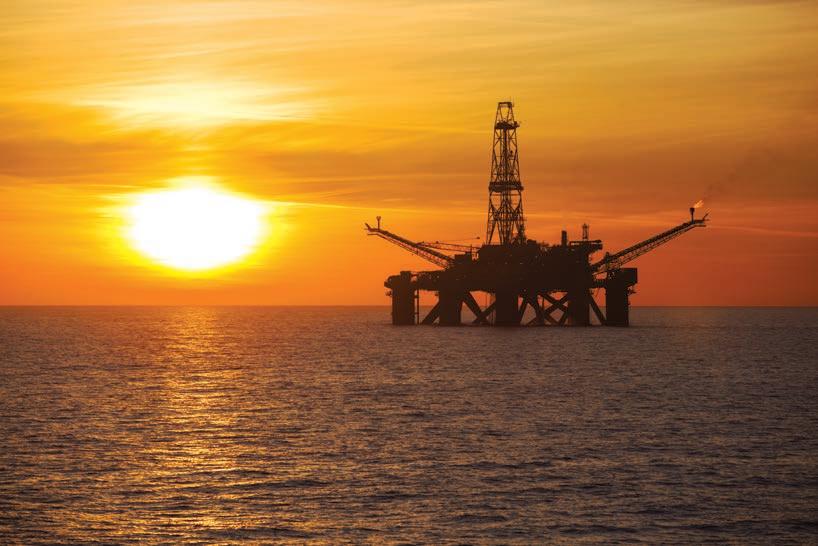
28 minute read
News
Frontier Energy webinar takes a look at what the future holds across the world
A FRONTIER ENERGY webinar held in August hosted leading speakers from around the world who shared their thoughts on the future of the energy industry and what this means for oil and gas operators which are seeking to remain competitive, emerge well from the COVID-19 pandemic and play their role in the global transition towards wider use of renewable enegy.
Olivier Mussat, chief investment officer, Global Energy, IFC highlighted the multiple ways the energy industry is coming under stress in these challenging times.
Image Credit: Adobe Stock
Mr Mussat talked about the importance of electricity in daily life and the impact of the low oil price, which has had a particular impact on developing countries who are dependant on oil for energy, adding that this has been coupled with power utilities seeing a serious drop in demand.
He added that the COVID-19 pandemic has exacerbated existing trends for energy companies and pure-play renewable companies’ stocks have more than doubled versus pureplay oil explorers. Equinor, the hydrocarbon producer with the lowest carbon footprint amongst all of the majors, has managed to stay relatively stable but this does not compare to the gains seen on the market by the pure renewable plays, Mr Mussat told the webinar participants.
Tabrez Khan, director, EMEIA transactions, EY, talked about deconstructing the role of oil and gas in the energy transition and shared EY’s view on fuelling the future and what scenarios we can see playing out in the short, medium and long term with regards to the mix between oil and gas and renewables.
According to Mr Khan, the variables that can impact demand and returns on energy are electric vehicles, energy efficiency, renewable energy and future of renewables, and how gas and renewables will work together. The gas and renewables interchange is a major question for the Future of Energy and a major interplay that needs to work well in the future, he said.
To conclude, Mr Khan presented four future scenarios of the energy landscape, all with varying degrees of rate of change in the future of energy depending on consumer attitudes and technological advances. However he maintained that oil and gas will remain an important part of the energy mix in the immediate and medium term.
Mr Khan outlined how oil and gas companies can win the
transition competition, which he
Could there be a new horizon for oil
and gas operators prepared to adapt? said must include maintaining a licence to operate, high grading portfolios, optimising cost and capital efficiencies, optimising profit from molecules moving through the value chain, recruiting, maintaining and motivating a workforce with the appropriate competencies and making innovation work in a corporate environment.
Equatorial Guinea seeks oil and gas engagement
GABRIEL MBAGA OBIANG Lima, minister of mines and hydrocarbons, Equatorial Guinea, has met with an oil and gas industry delegation in Malabo to discuss the COVID19 crisis and market conditions.
The delegation included senior representatives of ExxonMobil, Marathon Oil Corp, AMPCO, Noble Energy, Trident Energy, EG LNG and Kosmos Energy. The minister thanked them for giving the Baney Epidemiological Laboratory with equipment to prevent and reduce the spread of coronavirus.
Mr Obiang Lima said he received a letter from the industry regarding concerns over forex regulations imposed by the Bank of Central African States. He insisted that mitigating the economic and business impact of the COVID19 pandemic remained a priority for recovery and investment.
“COVID-19 is a major concern for the Government of Equatorial Guinea, and listening to the concerns of local and international private companies operating in the country is for us a way to ensure industry growth and sustainability,” he said.
“Once the difficult times are over, we remain confident that oil and gas operators and all of the people of Equatorial Guinea will be able to work together, getting back to work and putting the economy back on a growth trajectory,” Mr Obiang Lima said. “It is important that we plan our recovery efforts hand in hand with the industry so that we can move quickly and efficiently when market conditions stabilise.”
Eni makes new oil discovery in Egypt
ENI HAS DISCOVERED new oil resources in the Western Desert of Egypt with a new exploration well in the South West Meleiha Concession. Production in the concession started a year ago.
The SWM-A-6X well is located in the South West Meleiha development and exploration concession located in the Egyptian Western Desert, 130km north of the Siwa Oasis.
The new well has been drilled close to existing production facilities and is already connected to the production network, continuing Eni’s trend of bringing hydrocarbons into production in swift time.
The production from South West Meleiha Concession began in July 2019 and in just one year ramped up to 12,000 bopd thanks to the contribution of new discoveries. The SWM-A-6X well, drilled in the Faghur basin, reached a total depth of 15,800 feet and hit 130 feet of net oil pay in the Paleozoic sandstones of the Dessouky Formation. The well is already on stream with a daily production of 5,000 bopd.
Eni is implementing its nearfield exploration strategy in the Egyptian Western Desert through AGIBA, a joint venture with the Egyptian General Petroleum Corporation (EGPC), quickly turning on production of the newly discovered resources.
The Italian company has been present in Egypt since 1954, where it is the largest producer. Eni’s current equity production is above 300,000 barrels of oil equivalent per day.
For more updates on the oil and gas industry in North Africa, turn to our cover story on page 13.
Nigeria finalises Africa Trade Insurance Agency membership amid oil concerns
NIGERIA’S PRESIDENT MUHAMMADU Buhari signed the instrument of ratification to the African Trade Insurance Agency’s (ATI) treaty. This finalises Nigeria’s membership in ATI in a process that began some years ago. Membership allows Nigeria to attract additional insurance capacity to help attract investments, and it also increases ATI’s capacity to support sovereign and commercial transactions in the country.
Nigeria’s membership comes at a critical time for the economy as a sharp drop in oil prices due to a COVID-related one-third decrease in demand, has impacted the country’s spending plans. The IMF predicts that falling oil prices will halve Nigeria’s export earnings to US$26bn, which traditionally
Image Credit: African Trade Insurance Agency
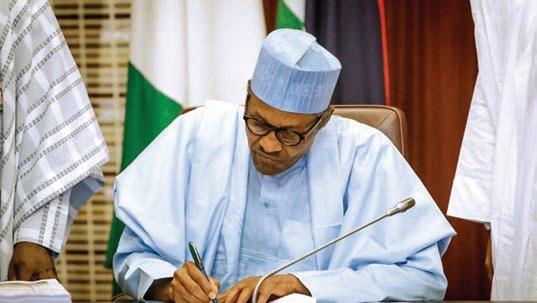
President Buhari signs up to the African Trade Insurance Agency Treaty.
accounts for 90 per cent of the government’s budget.
In Nigeria, ATI has already provided significant support in the country’s oil and gas sector by offering insurance to oil traders.
“As one of the largest economies in Africa with a vibrant private sector, ATI looks forward to working with the Ministry of Finance, the Central Bank, local financial institutions and corporate traders to support Nigeria’s economic diversification plans and its post-COVID recovery,” said Benjamin Mugisha, ATI’s chief underwriting officer.
Democratic Republic of Congo seeks to push ahead with monetising gas projects
DESPITE ITS HIGHLY productive neighbours, oil production in the Democratic Republic of Congo (DRC) has lagged behind. In 2019, only French independent Perenco produced from the DRC, at an average rate of 25,000 boepd from 11 onshore fields.
President Félix Antoine Tshisekedi has made energy security and investment an important priority, seeking to get massive hydropower projects off

Image Credit: African Energy Chamber the ground and diversify the country’s energy mix.
In another decision supporting the development of the DRC’s hydrocarbons industry, President Félix Antoine Tshisekedi requested its Minister of Hydrocarbons, Hydraulic Resources and Power and its Minister of Finance to fast-track legal processes and permits pertaining to the valorisation of the natural gas produced onshore by Perenco. The decision was taken at the latest Council of Ministers in Kinshasa.
The move is expected to result in the monetisation of natural gas through power generation, especially to address the DRC’s energy deficit and provide a stable supply of power to its booming mining industry.
Deepsea Stavanger welcomed to South Africa before going on duty at Mossell Bay’s Luiperd prospect
THE DEEPSEA STAVANGER oil and gas drill rig was temporarily anchored in Cape Town, before transportation to the Luiperd prospect off the coast of Mossel Bay. The oil and gas exploration drilling campaign, which is expected to be between 180-300 days long, will see R1.5 billion invested, including a number of initiatives to create opportunities for employment and skills development in the local economy. Forty-three on-shore positions have been filled by South Africans from Mossel Bay, including seven women who have been specifically appointed as part of a continued skills transfer programme.
“The arrival of the drill rig is an exciting development for the South African oil and gas industry and a symbol of the investment that will be shared by the local and regional economy in the Garden Route and the Western Cape,” said David Maynier, minister
Image Credit: Western Cape Government

Deepsea Stavanger docked in Cape Town.
for finance and economic opportunities, when the rig arrived at the port. “As a result of COVID-19, this project has faced many challenges and I am grateful to all those at the Mossel Bay Municipality and the Western Cape government who have worked hard to provide the assistance needed to make this investment possible.”

Mossel Bay municipal manager, Thys Giliomee, said, “Mossel Bay Municipality is looking forward to working closely with Total during the exploration off our coast, and hopefully Total will be able to conduct much of its on-shore operations from Mossel Bay. Given the economic challenges during COVID-19, Mossel Bay welcomes initiatives that may stimulate our local and regional economy and that may result in job opportunities.”
“Although it is currently an exploration process, Mossel Bay is confident that the preparatory work will be successful and that it will eventually contribute to the existing petrochemical industry in our area. We also look forward to welcoming the crew as tourists in our community and region, and hope that they will invite their families to visit Mossel Bay as soon as international travel becomes accessible again,” Mr Giliomee added.
Rainoil opens new LPG facility in Nigeria
DOWNSTREAM OIL AND gas company Rainoil has launched a new LPG facility with a tank capacity of 8000 metric tonnes at Ijegun, Lagos.
The LPG business offers a fleet capacity of around 40 LPG trucks that would ensure product distribution to bulk buying customers owning LPG filling facilities. In the coming months, Rainoil Gas will also meet customers’ energy needs at the retail end. There are filling plants in the process where LPG can be supplied in cylinders to consumers.
The group managing director, Rainoil Limited, Gabriel Ogbechie believes that Rainoil Limited's expansion aligns perfectly with the company’s vision and mission of continuously providing solutions to fill the gaps in the energy sector.
With a projected LPG market size of US$10bn, Nigeria has the fastest growing LPG sector in the world, with domestic demand increasing by 40 per cent. Rainoil Gas will support the policy of deepening LPG penetration by the federal government and will improve domestic LPG consumption nationwide. The business will increase LPG’s flexibility in domestic storage.
Over the past 20 years, Rainoil Limited has grown to include three petroleum product storage depots across Delta State, Cross River State and Lagos State; more than 81 retail outlets across the country; a fleet of more than 100 tank trucks for efficient product delivery; and one shipping vessel with a total capacity of more than 20,000 metric tonnes.
Siemens signs preventive maintenance contract with Egyptʼs ETHYDCO
SIEMENS ENERGY HAS signed a long-term preventive maintenance contract with the Egyptian Ethylene and Derivatives Company (ETHYDCO), for its industrial complex in Alexandria, Egypt.
Siemens Energy will provide a 10-year service contract to the petroleum product manufacturer covering three Siemens SGT-800 industrial gas turbines which have been in operation since 2017.
As part of the agreement, Siemens Energy’s Industrial Applications team will deliver the full spectrum of turnkey outage services, spare parts and repairs for the gas turbines. Currently, the power plant produces 150MW of electricity to power ETHYDCO’s petrochemical complex in Alexandria, which is the largest in Africa. TULLOW OIL HAS released a largely positive report for the first half of 2020, with the new CEO, Rahul Dhir, confident that the business can be rebuilt following the impact of the COVID-19 pandemic and low oil prices.
“Since becoming CEO on 1 July, I have been impressed by the quality of Tullow’s people and the potential of our assets and I am confident that we can build Tullow into a competitive and successful business once again,” said Mr Dhir. “Despite the challenging external environment in the first half of the year, Tullow has performed well; delivering production in line with forecast, agreeing the sale of the Ugandan assets and re-shaping the Group’s structure and cost base. In the second half of 2020 our focus will
The collaboration between ETHYDCO and Siemens Energy will allow all preventive checks to be carried out by the technical teams while minimising unnecessary downtime.
“As a major contributor to the petrochemical and downstream industries in Egypt, we focus on strengthening the all-round efficiency and safety standards of our plants,” said Ayman El-Shafei, maintenance general manager at ETHYDCO.
“Reducing unplanned downtime and increasing the operational workflow is critical towards achieving our production targets. The longterm preventive service agreement with Siemens Energy is aligned with our strategy,” he added.
The preventive maintenance Rahul Dhir, the new CEO for Tullow Oil. remain on continuing to deliver safe and reliable production from West Africa, reducing debt and building a cost effective and efficient organisation that can compete in a low oil price environment.” solution from Siemens Energy improves the reliability and availability of the gas turbines by extending the duration between maintenance intervals, resulting in reduced operating costs. Furthermore, by reducing annual carbon dioxide emissions, preventive maintenance will help deliver additional environmental benefits.
“This latest agreement with ETHYDCO is representative of our growing relationship and symbolic of the benefits that Siemens Energy’s service offerings can provide, not just in terms of operational and availability improvements, but also in terms of environmental benefits, with reduced emissions,” said Ashraf Hamasa, head of the service and digital business unit
Tullow Oil reports a promising first half for 2020 with plans for debt reduction
at Siemens Energy in Egypt.
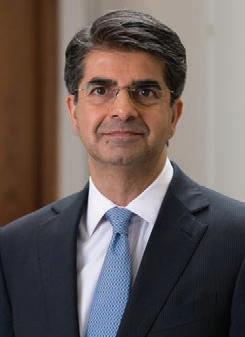
Image Credit: Tullow Oil
Gross Jubilee production averaged 84,700 bopd, gross TEN production averaged 50,900 bopd and net production from the non-operated portfolio was 23,700 bopd.
Ghana operational performance has been strong, with uptime on both FPSOs in excess of 95 per cent. Completion operations on the Ntomme-9 production well at TEN are ongoing, with the well due onstream in August.
The impact of COVID-19 on the Kenya programme led the Joint Venture with the Kenyan government to call force majeure on its licences which will delay FID and impact the ongoing farm-down process. Discussions are ongoing with government regarding next steps.
Afreximbank invests US$400mn in Mozambique LNG
THE AFRICAN EXPORT IMPORT Bank (Afreximbank) has committed up to US$400mn in guarantees and direct lending to Mozambique’s US$24bn Area 1 LNG Project.
The financing will be used to partially fund the project development activities required to extract natural gas offshore, its transfer to onshore processing facilities and then its conversion to LNG for export to various markets around the world.
The initial development is expected to produce more than 16tcf of gas and 93mn barrels of condensate over a 30-year period. It is expected that investment will create jobs, and drive sustainable growth for the country and the
The Mozambique LNG project is ambitious. region. The guarantee is done jointly with Export Credit Insurance Corporation of South Africa SOC Limited, which has enabled a significant African contribution to the overall financing. This joint collaboration is offered under the South Africa Trade and Investment Promotion Programme.
Afreximbank is again deploying its ECA-Plus guarantee, offered under the Afreximbank Guarantee Programme, to support this project.
The ECA-Plus guarantee facilitates collaboration between Afreximbank and global export credit agencies where

Image Credit: Africa Oil & Power Afreximbank uses its guarantee to share risk with ECAs in African related transactions and projects by way of co-guarantees and re-guarantees. The objective is to help create capcacity, reduce risk and unlock capital for African trade and investments.
Prof. Benedict Oramah, president, Afreximbank, said, “We believe that the success of projects such as this will create a precedent through which other development projects in Africa can secure funding and gain international traction.
“We are delighted to be one of the key stakeholders involved in this project, which will accelerate the rate of growth of intraAfrican trade.”
OPEC-Gabon meeting enhances cooperation and assists with investor confidence during a turbulent year
THE OPECGABON Bilateral Meeting, which was held in July, has underlined the importance of maintaining constructive dialogue and cooperation between OPEC and Africa’s oil-producing countries. Gabon rejoined OPEC in 2016.
In particular, the meeting highlighted the need for international, high-level engagement in the wake of the production cuts which were agreed to in April this year. The Gabon delegation championed its support for global market stability and energy cooperation, with the aim of giving confidence to operators and future investors seeking to do business in Central Africa.
Gabon’s ongoing 12th Offshore Licensing Round was launched in November 2018 and has met with significant success, resulting in the signing of a record number of PSCs in sub-Saharan Africa last year. In response to ongoing, often turbulent, market conditions and the impact of the COVID-19 pandemic, Gabon’s Ministry of Petroleum, Gas and Mines extended the submission deadline beyond 30 April, 2020. The extended round gives investors an opportunity to keep studying this new upstream frontier, with 35 blocks on offer.
The country’s Hydrocarbons Code, which came into effect in July last year, aims to put forward a more competitive upstream fiscal regime, provide a strengthened enabling environment for investors, and promote the development of marginal fields by local players.
Before the the COVID-19 pandemic and the subsequent production cuts, Gabon had reversed a historic decline in domestic oil production and had made new significant offshore discoveries.
As well as the bilateral talks, Gabon participated in the 20th Meeting of the Joint Ministerial Monitoring Committee (JMMC), which took
Gabon’s petroleum minister, Vincent de Paul Massassa. place via videoconference in July, under the chairmanship of Prince Abdul Aziz Bin Salman, Saudi Arabia’s energy minister, and co-chair Alexander Novak, the Russian Federation’s energy minister.
At this meeting, the committee reviewed the crude oil production data for June 2020 and praised the overall conformity level for participating OPEC and non-OPEC Countries at 107 per cent in June 2020, an achievement that found wide recognition in the market. The committee welcomed the participation of Angola, Gabon, South Sudan and Congo at the meeting, and noted that they had reiterated their commitment to the production adjustments and compensation plans.
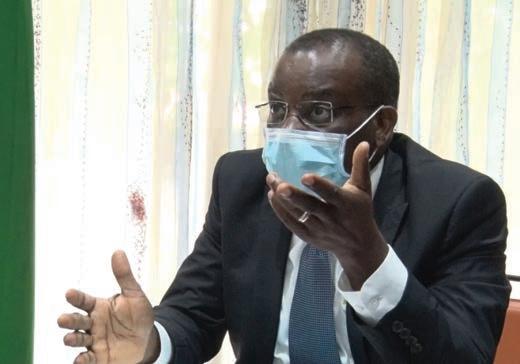
Nigeria has new gas transportation network
THE NIGERIAN GOVERNMENT has inaugurated the national gas transportation network that sets out the terms of gas transportation specifically between gas producers, shippers and their agents.
According to Timipre Sylva, Junior Minister, Petroleum, this will help to grow the gas infrastructure, expand gas utilisation, curb gas flaring and provide codes to standardise the gas value chain in line, and go a long way in deepening economic development, improve gas supply and attract more investment opportunities in the nation’s gas value chain.
Sylva said, “It is my firm belief that the implementation of the network code, which is a set of rules and principles guiding the use of and operations of gas transportation network system, will deepen the domestic gas market. It will also unleash the potentials of accelerated growth and economic development for our nation.
“In the coming months, this code, together with related intervention, will improve gas supply to power, growth of gas based industries, domestic LNG, LPG and CNG penetration, as well as enhance revenue to the government and create investment opportunities for our people.”
Sylva said the Network Code Electronic Licensing and Administrative System, NCELAS, has been developed, which will be used by the regulator to issue all applicable licenses to all network players as well as administer all regulatory roles required to ensure the optimal market impact.
Somalia establishes its first petroleum authority following February legisaltion
SOMALIA’S MINISTRY OF Petroleum and Mineral Resources has approved the board members of the Somali Petroleum Authority (“SPA”) and appointed Ibrahim Ali Hussein its first Chairman and Chief Executive Officer.
The Petroleum Law, ratified in February this year, provided for the establishment of the SPA to be the competent government authority to regulate the development of the country’s oil and gas industry.
Ibrahim Ali Hussein has been senior economic advisor to the ministry since November 2014, playing a leading role in the development of the regulatory and commercial framework for the development of the oil and gas industry. The Petroleum Ownership Management and Revenue Sharing Agreement is
Abdirashid Mohamed Ahmed, Somalia’s petroleum minister. designed to ensure equitable investment in development across the country while recognising the differing requirements in regions that will be closely involved in production.
“The establishment of the Somali Petroleum Authority is one of the first critical milestones of the implementation of the Petroleum Law. The Authority comes into existence when the country is commencing its first exploration activities,” said Abdirashid Mohamed Ahmed, Somalia’s petroleum minister.
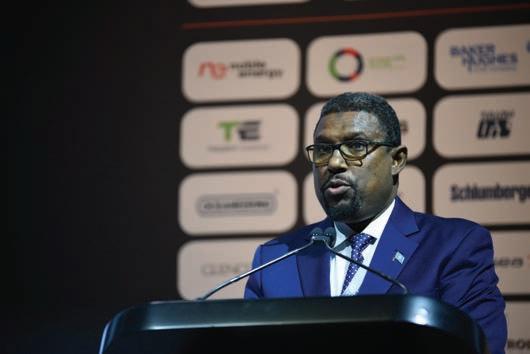
Lukoilʼs expansion plans for Senegal receive a boost with Sangomar acquisition
LUKOIL HAS REACHED an agreement with Cairn to acquire their Senegalese assets, including a share of the Sangomar development. This suggests confidence in the assets on the part of Lukoil, according to Conor Ward, upstream analyst, Global Data.
“News that Lukoil is looking

Image Credit: Woodside Enerrgy to expand in Western Africa comes as no surprise as the region has seen a flurry of spending from the company over the last decade – with its acquisition of a stake in major projects such as the Pecan field in Ghana, the Bonga Southwest/Aparo field in Nigeria, the Marine XII license offshore in the Republic of Congo, and the Fortuna LNG project in Equatorial Guinea,” said Mr Ward. “Lukoil hopes to see major growth from these projects in the next decade as its foothold in Western Africa has potential to grow fivefold from approximately 14,000bd in 2020 to approximately 70,000bd by the mid-2020s. Sangomar will add an estimated 20,000boed to Lukoil’s portfolio at peak.”
ADM Energy pre-qualifies in bidding for Nigerian marginal oil fields as technical partner to OilBank
ADM ENERGY HAS successfully pre-qualified in the Nigerian Government’s 2020 marginal field bid round. The company is participating in the bid round as the exclusive technical partner of OilBank International, a Nigerian integrated oil and gas service management company.
In June this year, the Nigerian Department of Petroleum Resources (DPR) launched a new bid round for 57 marginal fields covering onshore, swamp and shallow offshore fields.
The bid round, which is the first in Nigeria since 2003, is open to indigenous companies as well as companies such as ADM alongside local partners. After successfully demonstrating the required technical and financial capabilities, ADM and OilBank have now prequalified for the second stage of the Bid Round which consists of technical and commercial bid submission. The DPR is intending for all submissions to be returned by the end of August 2020.
ADM is participating in the bid round after signing a MoU with OilBank as its exclusive technical partner to support its bidding for any future development of the marginal fields. If OilBank’s application for a Marginal Field Licence is successful and it is awarded a licence, the company intends to enter into an agreement with OilBank under which ADM expects to participate in any awarded fields.

The bidding round heralds a new direction for Nigerian oil.
“The MoU with OilBank gives oil and gas assets,” said Osamede us a high-quality local partner to Okhomina, CEO of ADM. work alongside our team of expert Biodun Otunola, director, technical advisers. This, combined OilBank, added, “We have great with the Trafigura strategic confidence in ADM as our alliance for up to US$100mn of exclusive technical partner for pre-financing, means we are in a this marginal field round, the strong position to evaluate and first to be launched in Nigeria in finance investment into attractive nearly 20 years.”
Wood Mackenzie warns that oil and gas demand recovery is at risk if there is a second wave of the COVID-19 pandemic

AS OIL DEMAND recovers, but the risk of a second wave of coronavirus remains, which could have a second impact in the global oil and gas industry, according to Dulles Wang, director, Americas gas research at Wood Mackenzie, said, “Our H1 2020 outlook anticipates an oil price rebound as demand starts rising post-coronavirus. However, a second large-scale lockdown would deepen the recession, and possibly delay any rebound in GDP until 2022.”
“In our base case forecast, Brent rises to US$86 per barrel annual average in real terms by 2030. In a coronavirus-lockdown second wave (CSW) scenario, this falls to US$70 per barrel,” he added.
“Our Global Gas Model Next Generation (GGM NG) shows that a second wave of large-scale lockdowns would result in global gas demand reducing by 4.5 per cent in 2020 (vs 2019). Global LNG demand would also fall, putting further pressure on Europe to absorb the LNG oversupply – and causing further delays to LNG projects under construction,” Mr Wang noted.
He said the pre-FID projects might become more challenging as the need for new supply of LNG could stall. Production of low-cost gas would drive prices. The energy transition weighs heavily on industry strategy, and could dissuade investment, particularly with tight budgets and low oil prices. When the oil price crashed, the lower 48 operators were already under pressure, and many are still in financial distress.
WHAT NEXT FOR NORTH AFRICA?
The North African region has not been immune to the challenges presented by COVID-19, the oil price slump and the likelihood of a global economic recession. However, there are some promising areas for investment. Georgia Lewis reports.
NORTH AFRICAN OIL and gas producers have not been immune to the challenges that have been presented in 2020, particularly the COVID-19 pandemic and oil prices, which reached historic lows earlier this year.
An examination of committed and planned investments is a good barometer of the long-term health of the oil and gas industry in the Middle East and North Africa (MENA) region. APICORP has released its annual investment report, the MENA Energy Investments Outlook Report 2020, which finds that the company has significantly reduced its investment outlook amount for 2020-2024 to US$792bn, a US$173mn drop compared with US$965bn in 2019-2023.
This drop is largely attributed to COVID-19, the oil price crisis, and a looming financial crisis. Investments across the region are driven primarily by investments in Saudi Arabia, the UAE, Iraq and Egypt. The private sector’s share in energy investments falls to 19 per cent in 2020 as compared to 22 per cent in 2019. Energy sector’s capital costs were cut by at least 20 per cent, particularly in oil and gas, leading to a possible wave of mergers and acquisitions.
Compared to 2020’s initial figures, planned upstream spending has been cut by 20-30
Petrochemicals could hold the key to investment success in Egypt.
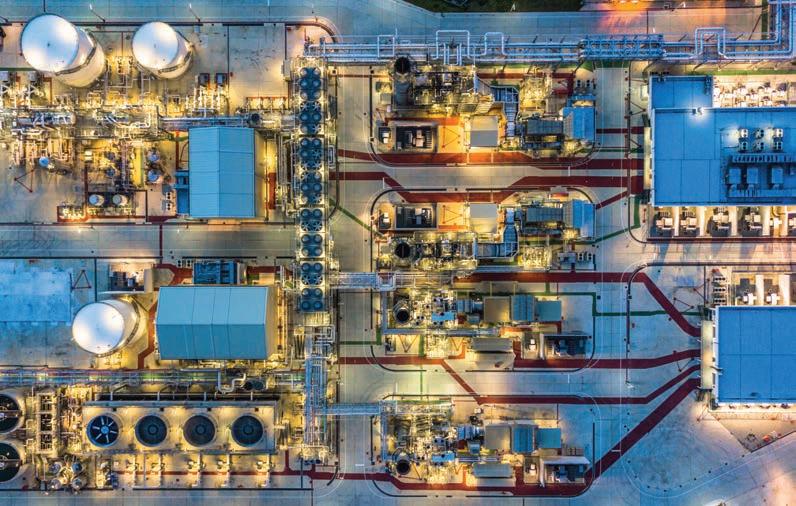
per cent across the board in the MENA region by oil majors, NOCs and big independents as a result of the price slump and
Egypt is a very prospective region with open-door licensing which may attract companies with significant free cash flow.”
unprecedented drop in demand in the wake of the COVID-19 pandemic. However, unconventional gas and nonassociated gas developments aimed at domestic consumption and strategic market share positioning for exports are expected to offset the impact on the upstream sector in the MENA relative to the rest of the world, the report found.
In Egypt, the report notes, the country’s petrochemicals drive is the most promising sector with a value of US$38bn.
Rystad, meanwhile, produced a report in July on global lease round scenarios after the oil price crash in which Egypt was described as “a very prospective region [with] open-door licensing, under which we might witness the willingness to participate from companies with significant free cash flow”, although the report still described Egypt’s prospects in lease rounds as “tentative”.
Russia and China both have local players as the common bidders in Egyptian licensing rounds and might therefore still go ahead with their scheduled rounds, the report added.
In Libya, which has a long
history of political unrest, the onset of the COVID-19 pandemic came at a time when the country’s economy is dramatically affected by a sharp drop in oil production in addition to the global drop in oil prices.
This has happened ion tandem with ongoing social and political disruption but there was some positive news when, in July, the Libyan National Oil Company announced the resumption of oil production and exports after a shutdown which lasted almost six months.
Force majeure had been declared due to conflict but this has been lifted, allowing oil production and exports to resume.
It remains to be seen if the lifting of force majeure is premature. At the end of June, Russian and other foreign mercenaries had, according to the NOC, entered a strategic oil field in southern Libya.
In a statement, the NOC said that mercenaries drove into Al-Sharara oilfield in a convoy of vehicles. When operational, Al-Sharara, which is run by the Akakus company, a joint venture between NOC, Repsol, Total, OMV and Statoil, produces 315,000 barrels per day, which is nearly one-third of Libya’s crude output.
Elsewhere in the North African region, gas is playing an important role. In Morocco, for example, gas development is taking place in tandem with a growing renewable energy sector.
In bright news for the country, Moroccan-focused upstream gas company, Sound Energy, has renegotiated its Anoual Exploration Permits with Moroccan National Office of Hydrocarbons and Mines (ONHYM) with its partners in the project.
In the original contract, the initial exploration period was three years expiring on 31 August 2020. This included FTG
Morocco and Algeria are seeking to balance the use of fossil fuels with renewablles.

aerogradiometry, 600 kilometres of 2D seismic and 150 square kilometres of 3D seismic. Under the renegotiated terms, the initial period is now four years and four months, expiring in December 2021, with FTG-aerogradiometry and 600 kilometres of 2D seismic and one exploration well with Triassic objective.
Additionally, if the next round of exploration looks likely to yield commercial quantities of gas, the contract can be extended for an extra two-and-a-half years from 31 December 2021.If this turns out to be the case, Sound Energy will acquire 150 square kilometres of 3D seismic or its equivalent in 2D seismic data.
Conversely, if it is found that a commercially viable gas deposit is unlikely, more geological and geophysical studies will take place. However, there will be no obligation to acquire this extra seismic data.
In Algeria, the oil sector has been cheered by reforms which are designed to encourage foreign investment in energy projects and a new oil and gas law, which came into force in January this year. Under the new legislation, the tax burden on Sonatrach and its international partners will be reduced from 85 per cent to around 60-65 per cent.
However, the country’s oil and gas industry has experienced setbacks, including a fall in crude sales in the first nine months of last year to US$24.6bn from US$29bn in the same period of 2018. Hopes of a shale gas oil revolution similar to the USA’s suffered a blow with shale exploration potential expected to fall by 7bn barrels of oil, according to Rystad Energy.
In the gas sector, Algeria's pipeline exports to Spain and Italy fell by more than 11bcm year-on-year in 2019 to 21.1bcm, according to S&P Global Platts Analytics data. The S&P data went on to record that this export decline was only partly offset by higher LNG exports, which increased by almost 2bcm to 16.4 bcm of gas equivalent.
For Algeria, it could be beneficial to look at its local market for oil and gas opportunities. A growing
Gas is playing an important role in Morocco as it is being developed in tandem with the renewables sector.”
population, currently at more than 43mn people, equates to growing energy demand for domestic, commercial and industrial use.
While the Algerian government is keen to increase the use of renewables in the energy mix, there will still be opportunities for fossil fuels. The government’s goal is for Algeria to achieve 27 per cent of its total electricity production from renewable sources by 2027.
While 2020’s low oil prices have had a direct impact on North Africa’s oil and gas producers, the impact of low oil prices in the Middle East has had a knock-on effect on the broader economies of North African countries. A World Bank report found that remittances to the Middle East and North Africa region are projected to fall by 19.6 per cent to $US47bn in 2020, following the 2.6 per cent growth seen in 2019. The anticipated decline is attributable to the global slowdown as well as the impact of lower oil prices in GCC countries − it is a timely reminder that world economies are deeply interconnected and ensuring prosperity at a local level has become more important than ever.











